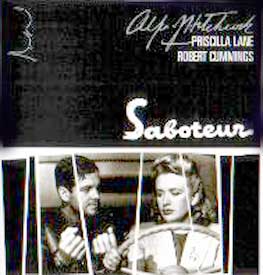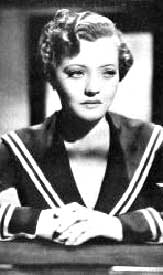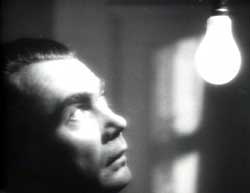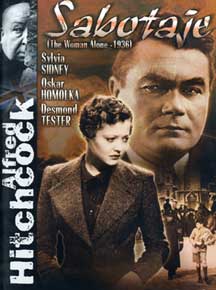 Despite jingoistic speeches, Saboteur (1942) is a fine film, & it is fun to see in nascent forms so many of Hitch's basic cinematic ideas so familiar from later films. Despite jingoistic speeches, Saboteur (1942) is a fine film, & it is fun to see in nascent forms so many of Hitch's basic cinematic ideas so familiar from later films.
Instead of falling off a California mission tower or a presidential nose on Mount Rushmore, it's a dangle from the upraised hand of the Statue of Liberty. Even such little images as a gun poking through a corner toward a room full of rich people is a recurring Hitchock visual.
The plot focused on innocence accused is one Hitch often recycled too, but it's all winning stuff even if familiar. There are moments of "spice" like hooking up with carnival freaks for a few minutes, & some amazing art design for the sets.
There's an unexpected attitude that circus freaks, the poor, & working class people are upright & decent, but rich people are all dumbasses or evil spies.
Although Bob Cummings is not a great actor, & quite rightly remembered more as a minor actor for early television, he's even so adequate for this job, & makes a splendid Regular Joe caught in a bind, & rising to heroic occasion when confronted by wrongdoing & injustice.
 Based on Joseph Conrad's The Secret Agent: A Simple Tale (1907), Alfred Hitchock's Sabotage (aka, A Woman Alone, 1936) begins with London's electricity going out, due to sabotage. Some fine & moody night photography elaborates the sequence of events. Based on Joseph Conrad's The Secret Agent: A Simple Tale (1907), Alfred Hitchock's Sabotage (aka, A Woman Alone, 1936) begins with London's electricity going out, due to sabotage. Some fine & moody night photography elaborates the sequence of events.
When Londoners fail to panic, but respond with an impromptu city-wide candle-lit party, saboteur Karl Verloc (Oskar Homolka) feels the snub of failure, & the foreign interests he works for want him to commit a much more horrendous act of sabotage.
Verloc is a German resident of London, owner of a small cinema, & the film was made immediately before WWII, when already quite obviously disdain for the Germans ran high. Conrad's original story was about spying immediately before WWI, but all too easily adapted to a new moment in history.
The German agent is married to a lovely young Englishwoman (Sylvia Sidney). The green-grocer next door (secretly of Scotland Yard) would seem to be a more appropriate romantic interest, & why such a nice girl is married to a sinister-acting boob is never particularly understandable.
 Karl Verloc's secret meetings with terrorists & other spy shenanigens are marginally interesting. Since Londoners weren't panicked to find themselves without electricity for a while, the next planned sabotage will involve a bomb. A sleezy petshop owner is secretly an anarchist who who makes bombs. Karl Verloc's secret meetings with terrorists & other spy shenanigens are marginally interesting. Since Londoners weren't panicked to find themselves without electricity for a while, the next planned sabotage will involve a bomb. A sleezy petshop owner is secretly an anarchist who who makes bombs.
A little boy in the household seems to have been written as Mrs. Winnie Verloc's brother Stevie (Desmond Tester) merely so that we needn't worry that an Englishwoman is actually breeding with a German spy. They are nevertheless in effect his mother & father, & Karl Verloc seems really to love his family, despite that his national allegiance is not British. He nevertheless sends the lad on to a certain address with cans of film that actually contain the bomb.
[SPOILER ALERT] When Mrs. Verloc realizes her husband is not only a spy, but has put Stevie at extreme risk, she rather inexplicably stabs him without a second thought. The Scotland Yard sargent (John Loder) helps cover up the act of murder, seeing to it that the bombmaker gets blamed. The script never really acknowledges the amoral & criminal nature of this "happy" ending, but it's Hitchock after all, & we have to assume he knew what he was pulling. [END SPOILER ALERT]
Hitchcock always liked to include an extra visual treat in each of his films, & this time out, he got Walt Disney to provide a bit of animation.
copyright © by Paghat the Ratgirl
|

